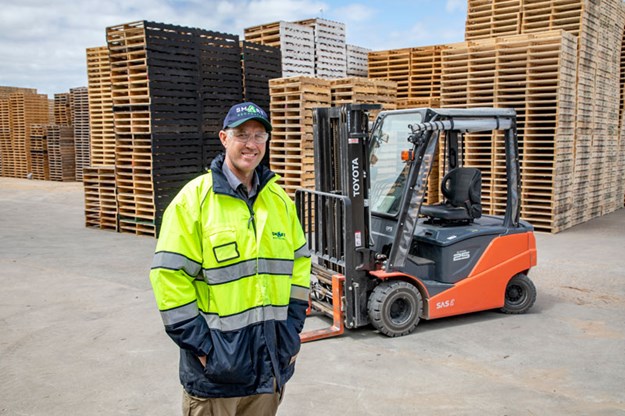An environmental entrepreneur operating some of Victoria's largest recycling businesses has unlocked the economic potential of Toyota Material Handling Australia's electric forklifts by charging them with solar electricity.
 |
|
Smart Recycling Managing Director, Ward Petherbridge and one of the Toyota 8FBN 2.5-tonne electric forklifts
|
Operating from Dandenong South, Victoria, Smart Recycling and its associated businesses annually divert over 50,000 tonnes of waste from landfill and is one of the state’s largest timber pallet recyclers.
The Smart Recycling site transforms 95 percent of received waste into cost-effective, environmentally friendly products.
Managing director Ward Petherbridge sparked his passion for environmentalism whilst studying environmental science at university in the Netherlands and afterwards brought his learnings back to Australia.
“In 1995, I thought it would be a good starting point to separate green waste for composting and to make a blended top-soil. Then timber-mulching. We grew from there and then started making pallets. Now, recycled pallets represent about 80 percent of the turnover on the Smart Recycling site.
“We manufacture pallets from recycled timber and also repair damaged pallets. We provide a net carbon benefit of 14,500 tonnes from timber recycling, alone. That business employs about 40 staff and that’s what all the Toyota forklifts on that site are for.”
Presently, Smart Recycling has four Toyota 8FBN 2.5-tonne electric forklifts and is about to add another to its fleet.
The site’s former business relied exclusively on diesel-powered forklifts but after installing a massive solar-system on the depot roof, Mr Petherbridge intended to harness its economic potential by switching to battery-powered Toyota forklifts.
The heart of Smart Recycling’s business is reducing energy consumption and waste via efficiency which, hand-in-hand, creates an economic benefit and competitive edge.
“It’s the ethos of our business: our mantra is reduce, reuse, recycle, recover – and it also makes economic sense,” said Mr Petherbridge.
“With our transition from diesel to electric Toyota forklifts we are saving a-good $100 per week, per machine on fuel. That really adds up as savings.
Toyota Material Handling Australia (TMHA) area sales manager, Grant Owen, said he personally shares Mr Petherbridge’s commitment to reducing waste.
“Some forklifts are built with planned obsolescence, but we at Toyota Material Handling build our forklifts to last a very long time- so that in itself makes a significant accumulative difference over the lifecycle of the machine.”
Mr Petherbridge concurred: “We’ve had a lot of different forklift brands over the years and, comparatively, the Toyotas are very-well built.
“In terms of quality, you generally get what you pay for. Some forklifts are a fraction of the cost but they don’t have the same lifecycle. Toyota forklifts are resilient machines.”

